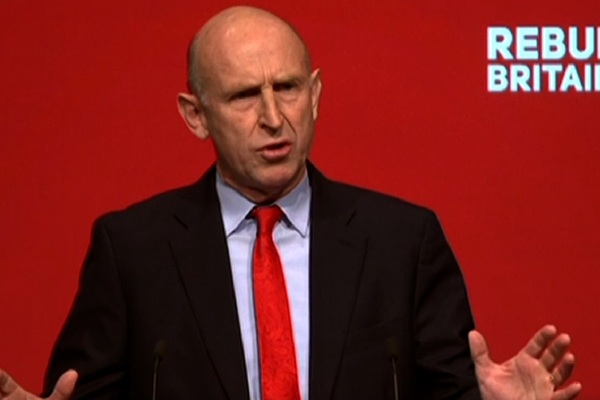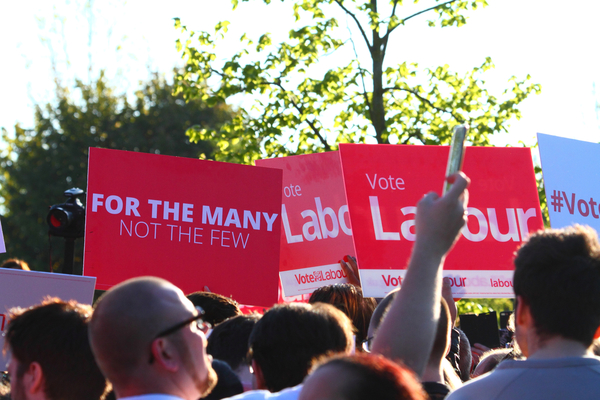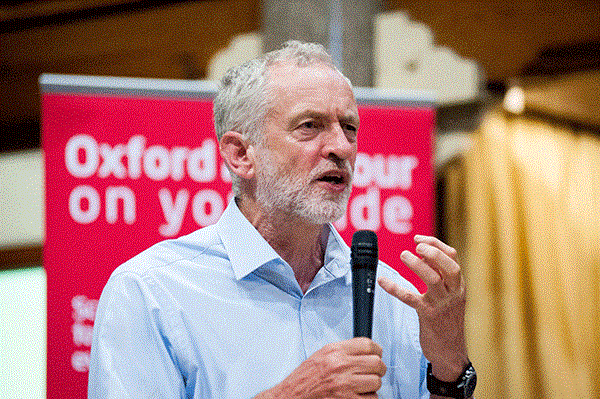You are viewing 1 of your 1 free articles
Dispatches from the Labour Conference
The Labour conference has just wrapped up in Liverpool. Nathaniel Barker sums up the key points after a busy five days in and around the conference
Unsurprisingly, Brexit dominated the headlines from this year’s Labour conference. Much of the murmuring in the various conference halls, exhibition centres and nearby pubs centred around the party’s position on this most fundamental and divisive of issues.
All other policy issues took a back seat – though perhaps housing less than others.
The slogan for this year’s conference, at the ACC on Liverpool’s famous docks, was “Rebuilding Britain for the many, not the few”.
The housing connotations here were surely no accident: it’s a key issue for Labour and its members, and speakers in the main hall touched on the topic again and again.
Housing is also the political strong point for the party – it consistently polls well ahead of the Conservatives on housing issues, more so than any other area.
There were no fewer than 20 fringe sessions on the subject across the four days, with Inside Housing in the room for many of them to get a sense of what Labour has to offer social landlords.
A brick wall
The first point to note is that Labour already has a fairly extensive suite of housing policies coming into conference season, unveiled as part of its ‘Labour’s New Deal on Housing’ mini-manifesto ahead of last year’s general election and more extensively still in ‘Housing for the Many’ – which it calls a green paper.
Listen to a podcast about Labour’s housing policies here:
These documents, drafted largely by the experienced shadow housing secretary John Healey, feature a host of eye-catching measures: scrapping the “affordable rent” product, a 10-year rent settlement, scrapping the Right to Buy.
Just last week, Mr Healey announced yet more measures to support smaller housing associations to build.
All very well, though of course, of limited use of when you’re in opposition, a fact which occupied the minds at some fringe events on housing.
Most radical
“The next Labour government will be the most radical government on housing since that great post-war Labour government, and we will do whatever it takes to end this Tory housing crisis.”
Those were the words of Mr Healey during his conference speech on Monday morning.
They represented a subtle tonal shift; in the past, Mr Healey has preferred to frame his policies as sensible, practical approaches to the housing problem.
His willingness to go further with the rhetoric is perhaps borne out of his belief, also in the address, that Labour is “winning on housing”, forcing the government “to change tack”.
Mr Corbyn’s stance towards housing associations appears to have softened
To that end, Mr Healey announced a holiday homes tax to raise funds for the battle against homelessness – deemed an attempt “to punish the middle classes” by the right-wing press, but popular with Labour members gathered at the conference.
Suspicious minds
Inside Housing’s Peter Apps has written in the past about a lingering dislike of housing associations among Labour members – who are far more enthusiastic about council housing.
At the party’s 2016 conference the tension came to a head, when Jeremy Corbyn’s office briefed that a plan to build 500,000 social rent homes referred to local authority housing only.
Since then, Mr Corbyn’s stance towards housing associations appears to have softened; in April, he bemoaned their “diminished role” as grant levels have waned.
But many of the Labour faithful remain unconvinced.
During a Q&A at one fringe session on how housing associations can help reduce poverty, Paul Hackett, chief executive of Optivo and chair of the G15 group of London landlords, was made to bear the brunt of a flurry of attacks against the sector – on the old grounds of accountability, size and chief executive pay.
Even Mr Healey, on the panel with him, had unusually tough words for housing associations – warning them not to “go over the top” in their praise for Theresa May’s National Housing Summit speech and questioning the sector’s dependence on government policy.
The past hostility has not gone unnoticed, it appears. A number of fringes at this year’s conference were sponsored or organised by housing associations – including, in one particularly brave move, an L&Q-backed event on how associations can reconnect with their social purpose.
Here, Andy Brown, the association’s chief operating officer, openly admitted that 74% customer satisfaction levels indicated the landlord “has a problems.
“Oh, Jeremy Corbyn”
…went the famous chant of his supporters as the Labour leader took to the stage to round off the conference.
Between Brexit and the anti-Semitism row, Mr Corbyn had lots to cover – and he also made sure to attack the Conservatives for “social vandalism” austerity.
In truth, the veteran socialist focused only briefly on housing, particularly considering his shadow housing secretary told the conference the day before that housing is Mr Corbyn’s “number one domestic priority”.
In truth, the veteran socialist focused only briefly on housing
However, he did touch on the holiday homes tax announcement: “Think of it as a solidarity fund, for those with two homes to help those without any home at all.”
And he pledged that “Labour will embark on the biggest home building programme for half a century” (slightly different to Mr Healey’s pledge for “the biggest council housebuilding programme for over 30 years”).
“We don’t want to live in a society where some of our fellow citizens sleep rough,” he mentioned near his conclusion.
That said, Mr Corbyn’s other pronouncements during a long speech may in time come to have significance for housing. “Privatisation and outsourcing are now a national disaster zone, and Labour is ready to call time on this racket,” he said, referencing the Carillion collapse.
And the 400,000 “green job” announcement does involve £12.8bn in subsidies for insulating homes – though this parallels with the “zero carbon homes programme” unveiled in Housing for the Many.
Labour planning commission terms of reference
- A set of proposals for a new system of local plan making underpinned by values and a purpose that sees planning as representing the public interest, and to examine how local authorities can lead and be champions of planning in their area in partnership with others.
- Establishing how planning policies and strategies developed at the national, regional, local and neighbourhood level can link together to provide better outcomes for our communities.
- Examining how local communities can better provide the building blocks of our planning system, and take ownership of planning policies that will affect them; establishing the framework to facilitate this.
- Identifying changes that need to be made to our system of planning gain, to streamline it and make it more efficient and transparent for developers and communities.
- Considering measures that will improve land supply, including changes that might need to be made to compulsory purchase orders.
- Considering changes that might need to be made to building regulations: to make buildings safer; to make buildings more energy efficient; to make buildings carbon neutral where possible.
- Exploring how the planning system could better support infrastructure development and how government at different levels can facilitate this.
- Considering how best to develop a new generation of garden cities, villages, urban extensions and new towns.
- How to improve the quality, design and sustainability of new buildings to help address climate change.
- How to drive forward innovative and modern methods of construction and improve access to digital networks and better computer assisted design.
- Make proposals for the training and support of planners to enable them to be a catalyst for visionary local planning to develop skills and ensure a pipeline of future planners exist.
- Considering how to better support the housing and construction sector with particular regard to the role that small builders, land trusts and cooperatives can play in the delivery of new housing and infrastructure to ensure greater diversity in the construction sector.
At a glance: Labour’s social housing proposals
- Scrap the affordable rent product and introduce new income-linked rents
- Introduce a new “Decent Homes 2” target for social landlords to improve fire safety post-Grenfell
- Make housing associations subject to the Freedom of Information Act
- Prohibit for-profit housing associations
- Set a new target of one million new affordable homes over 10 years, mostly at social rent
- Impose a new duty to deliver affordable homes on councils, introducing a new needs assessment and an affordable new homes bonus
- Establish a new English Sovereign Land Trust to help councils acquire land more cheaply.
- Form a new national tenants’ organisation and commissioner
- A “longer-term aim” for half of all new homes to be “genuinely affordable”
- Give housing associations access to Public Works Loan Board finance
- Consider returning in full the Treasury’s previous year’s share of Right to Buy receipts
- Introduce a planning “presumption” that all developments, including rural and smaller sites, will include affordable housing
- Help councils with no stock to start a Housing Revenue Account
- Fast-track Karen Buck’s Homes (Fitness for Habitation) bill
- Consult on requiring landlords to publish an annual “outsourcing statement”
- Consult on housing associations to be required to have tenants on their boards
















